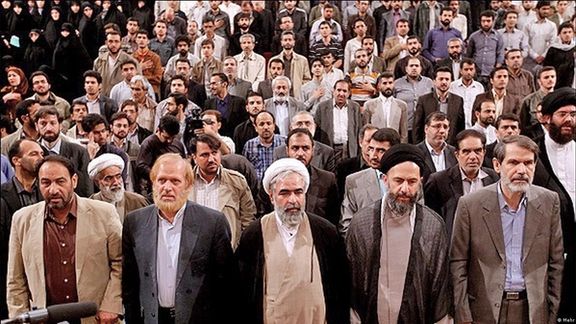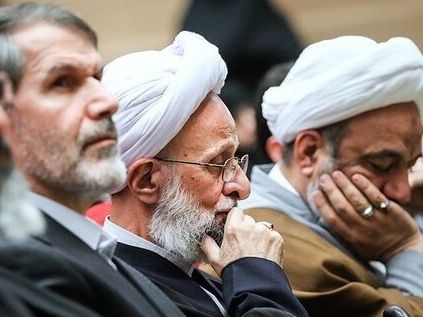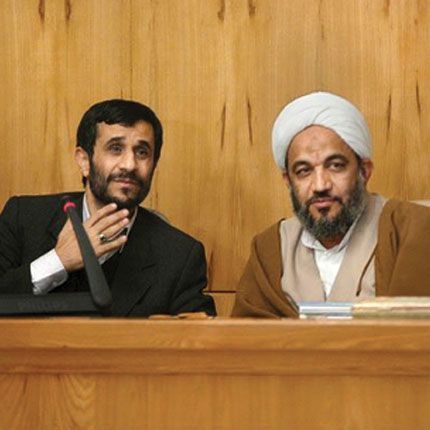Ultra-Hardliner Party Leaders In Iran Silent Over War In Gaza

Leaders of Iran’s ultra-hardliner Paydari (Steadfastness) Party have been conspicuously silent about the war in Gaza despite being vocal about domestic issues.

Leaders of Iran’s ultra-hardliner Paydari (Steadfastness) Party have been conspicuously silent about the war in Gaza despite being vocal about domestic issues.
The secretary general of the party, Sadegh Mahsouli, and the chairman of the party’s central council, Morteza Aghatehrani, have not made any public comments about the war raging in the Middle East. Considering that they are close allies with many top officers of the Revolutionary Guard, the reason for their silence remains a mystery.
The Paydari party has its tentacles in all government institutions including the parliament where their members form a very influential minority that often takes a leading role amid the weak presence of established conservative and reformist parties.
Paydari, which has always expressed maximum hostility towards Israel, however, in a statement earlier this month called the Hamas attack on Israel a “triumphant” operation and congratulated the “Palestinian resistance groups’ command”.
Mahsouli and Aghatehrani’s silence is particularly notable, as many other politicians -- including reformists such as the former President Mohammad Khatami whose rhetoric against Israel is generally very mild in comparison with hardliners -- have extensively condemned Israel in the past two weeks.

Mahsouli, a former Revolutionary Guard officer and a business tycoon who served in the government of the hardliner President Mahmoud Ahmadinejad as minister of interior and minister of welfare and social security, has been the party’s leader in the past three years.
Many believe Mahsouli, then interior minister, was the man behind the alleged rigging of the 2009 elections which secured a second term for the incumbent Mahmoud Ahmadinejad. He is among the officials of the Islamic Republic designated by the European Union.
Aghatehrani who is the chairman of the parliament’s cultural committee this week spoke to the media about the upcoming elections of the parliament and Assembly of Experts in March.
The Assembly, a constitutional body, is tasked with selecting the Islamic Republic’s next supreme leader. Reformists allege the party is planning to manipulate the assembly’s elections to suit its own interests.
Aghatehrani is known for having been a protégé of Ayatollah Mohhammad-Taqi Mesbah-Yazdi. The sixty-six-year-old cleric studied at Canada’s McGill; a university very popular with Mesbah-Yazdi’s circle in the early 1990s.
Aghatehrani then obtained a US Green Card while studying for a PhD in Middle East Studies at the State University of New York at Binghampton. There, he founded the Islamic Institute of New York and Razi Islamic school in Woodside.
Aghatehrani returned to Iran and to Mesbah-Yazdi’s famous Imam Khomeini Institute, a seminary in Qom, in 2004. A year later when Ahmadinejad was first elected to presidency, Aghatehrani was invited to join his government as the cabinet’s “ethics teacher”.
The party, and Aghatehrani as a lawmaker, are said to be behind a drive to purge government institutions of all rival factions and “Islamization” of the Iranian society including imposing tighter control on universities and other educational institutions, strict enforcement of compulsory hijab, and controlling the media and the cyberspace.

The drive to establish Paydari’s monopoly in the government and higher education came to be known as “the purification project.” Former parliament speaker and moderate conservative Ali Larijani, who among others oppose hardliners and are seen as centrists in Iranian politics, coined the term in May indirectly attacking the Paydari.
Paydari members had circulated a rumor that Larijani was trying to head an electoral block for the March parliamentary elections. “There is no talk about the elections or a nationwide slate, nor is there any consultation with other [political groups]. Therefore, the purification [-seeking] current need not worry,” Larijani responded in a brief letter and added that his ultra-hardliner rivals who blocked him from running in the presidential elections of 2020 could not expect to “create fake rivalry” and interest in the parliamentary elections.